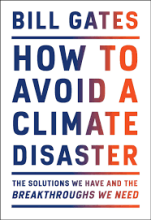How we keep cool and stay warm
15 important questions on How we keep cool and stay warm
According to Bill gates, malaria gave us air-conditioning, how can you explain this?
- This is because John Gorrie, a physician in Florida thought cooler temperatures would help his patients recover from malaria. In that time - in the nineteenth century - it was widely believed that malaria was caused by bad air, so this was the rason for developing air-conditioning.
How many households in the following countries now have some type of air conditioner, and what is striking about it?
- Japan
- U.S
- South Korea
- Saudi Arabia
- China
- mexico
- Brazil
- Indonesia
- South Africa
- India
- Japan; more than 90%
- U.S; 90%
- South Korea; around 85%
- Saudi Arabia; more than 60%
- China; 60%
- Mexico; around 15%
- Brazil; around 15%
- Indonesia; around 10%
- South Africa: less than 10%
- India; less than 10%
How much air conditioning units is expected worldwide in 2050?
- More than 5 billion air conditioning units in operation around the world
- Higher grades + faster learning
- Never study anything twice
- 100% sure, 100% understanding
For how much of all greenhouse gases is electricity used by buildings - air-conditioning, lights, computers and so on - responsible?
- It is responsible for nearly 14% of all greenhouse gases
What, according to Bill Gates, two things can can we do right now to reduce the amount of electricity need for air conditioners?
- 1) Consumers need to get the right information: a less efficient unit might be cheaper to buy, but more expensive to own in the long run, because it uses more electricity.
- 2) Countries need to set a minimum standards for the efficiency of air conditioners.
Air conditioners contain refrigerants - known as F-gases - why are F-gases bad for the climate?
- Over the course of a century, they cause thousands of times more warming than an equivalent amount of carbon dioxide;
In 2016, representatives from 197 countries committed to reducing the production and use of certain refrigerants - known as F-gases - by more than 80% by 2045, what does this commitment mean?
- Various companies are developing new approaches to air-conditioning that replace refrigerants - known as F-gases - with less harmful coolants;
Why can't we decarbonize hot water and air by cleaning up out electric grid?
- This is because most of them run on fossil fuels, not electricity, so we need to get heat from something other than oil and gas.
What, according to Bill Gates, is the path to zero carbon for heating?
- 1) Electrify what we can, getting rid of natural gas water heaters and furnaces, and;
- This can carry a negative Green Premium
- 2) Develop clean fuels to do everything else
According to Bill Gates, your overall costs will go down if you get rid of an electric air condioner and gas (or oil) furnace and replace both with an electric heat pump, but how would you pump heat and what is an advantage of it?
- How it works; By moving some coolant through a closed loop of pipes, using a compressor and special valves to change the pressure along the way so that the coolant absorbs heat from one place and gets rid of it somewhere else
- Heat pumps take advantage of the fact that gases and liquids change temperature as they expand and contract;
How much money can a heat pump save you?
- It depends on various factors, like how harsh the winter is and how much electricity and natural gas cost.
- For an example, the Green Premium of heat pump in Oakland is -23%, in Houston -27%, in Chicago -16% and in Providence -22%.
Heat pumps have a negative Green Premium, so they are such a great deal. Can you explain the two reasons why only 11% of the American homes have a heat pump?
- 1) We replace our furnaces only every decade or so, people don't have the money to simply replace a furnace with a heat pump;
- 2) Outdated government policies; since the energy crisis of the 1970s, state government created incentives to favor natural gas furnaces and water heaters over less efficient electric ones and many of these policies that prize efficiency over emissions are still on the books, restricting your ability to lower your emissions by swapping out a gas-burning furnaces for an electric heat pump - even if doing this would save you money.
If we has a goal of getting rid of all the gas-powered ones by mid-centry, when would we need to stop selling it and how many do we sell now?
- By 2035; today around half of all furnaces sold in the U.S run on gas
What, according to Bill gates, can we do to decarbonize our heating systems?
- Electrify as much as we can; replace gas-powered furnaces and water heaters with electric heat pumps.
- In some regions, governments will have to update their policies to allow these upgrades.
- Decarbonize the power grid by deploying today's clean sources where they make sense and investing in breakthoughs for generating, storing and transmitting power
- Use energy more efficiently; this can be hard because of the policies that prize higher efficiency over lower emissions
Bill Gates describes three things that need to be clear after you've learned about the five major sources of greenhouse gas emissions: how we plug in, make things, grow things, and keep cool and warm, about what three points is he talking about?
- 1) The problem is extremely complex, touching on almost every human activity
- 2) We have some tools at hand what we should be deploying now to reduce emissions
- 3) But we don't have all the tools we need. We need to drive down the Green Premiums in every sector, which means we've got a lot of inventing to do.
The question on the page originate from the summary of the following study material:
- A unique study and practice tool
- Never study anything twice again
- Get the grades you hope for
- 100% sure, 100% understanding
































